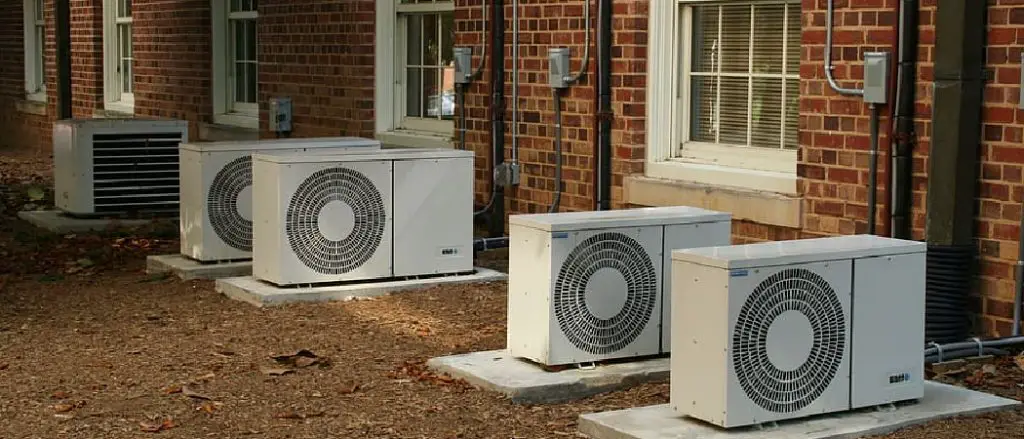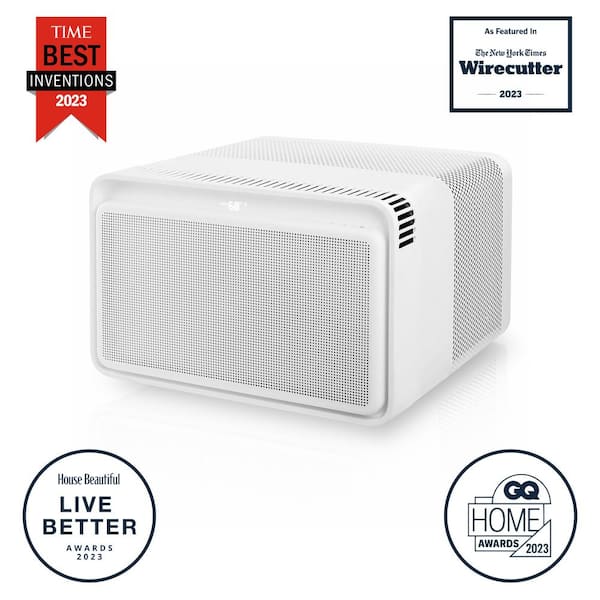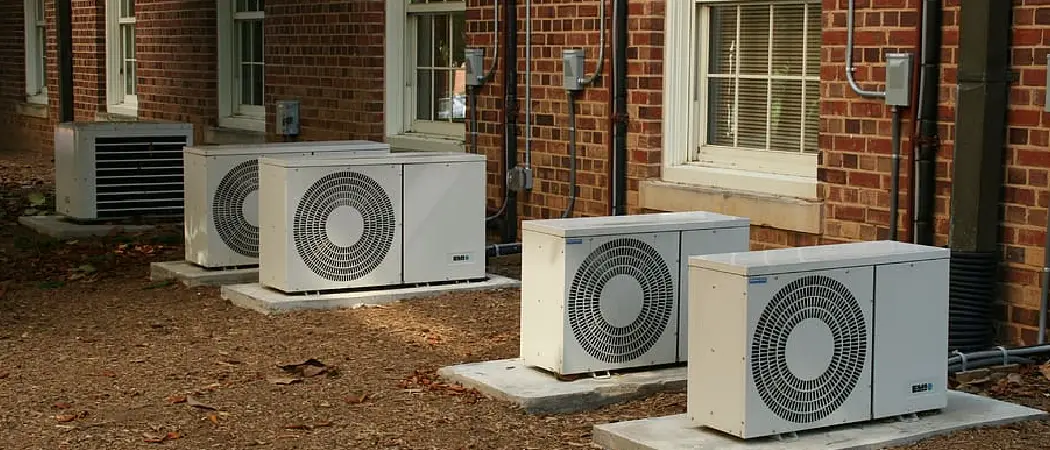To fix a noisy portable air conditioner, check for loose components and tighten them securely. Clean or replace the air filter to improve airflow and reduce noise levels.
Dealing with a noisy portable air conditioner can be frustrating, impacting your comfort and productivity. Whether you are working from home or trying to relax on a hot day, unwanted noise from your air conditioner can disrupt your peace. Fortunately, with a few simple steps and maintenance routines, you can effectively troubleshoot and resolve the noise issue with your portable air conditioner.
By following the right procedures, you can enjoy a quieter indoor environment and enhance the performance of your portable air conditioner.

Identifying The Noise
A noisy portable air conditioner can be quite bothersome, especially when you’re trying to relax or sleep. The first step in fixing the noise issue is to identify the source of the problem. By understanding the different types of noises and their possible causes, you can troubleshoot the problem more effectively. In this section, we will explore the different types of noises your portable air conditioner might make and the potential reasons behind them.
Different Types Of Noises
Portable air conditioners can produce various types of noises, each indicating a different issue. By recognizing these noises, you can narrow down the cause of the problem. Here are some common noises you might hear from your portable air conditioner:
- Grinding noise
- Clicking noise
- Rattling noise
- Buzzing noise
- Hissing noise
Let’s look at the possible causes associated with each type of noise.
Possible Causes Of The Noise
Understanding the potential causes of the noise will help you tackle the issue effectively. Here are some common reasons behind each type of noise:
Grinding noise
A grinding noise from your portable air conditioner can be a sign of a faulty motor or a misaligned fan. It could also indicate that the bearings are worn out or that the compressor is failing.
Clicking noise
If your portable air conditioner is making a clicking noise, it may be due to a problem with the relay switch or the compressor. Additionally, loose parts or a malfunctioning thermostat can also cause this type of noise.
Rattling noise
A rattling noise is often an indication that something is loose or vibrating within the unit. Check for loose screws, brackets, or fan blades. It could also be caused by the compressor or condenser coils being dirty or clogged.
Buzzing noise
A buzzing noise could be caused by a defective fan blade, a loose component, or dirty condenser coils. It could also indicate an issue with the motor or the electrical connections within the unit.
Hissing noise
A hissing noise usually suggests a refrigerant leak. The sound is caused by the refrigerant escaping from the system. If you suspect a refrigerant leak, it’s important to address it promptly as it can affect the cooling performance of your air conditioner.
Taking note of the specific noise and its corresponding cause will help you determine the necessary steps to fix your noisy portable air conditioner. In the next section, we will explore some possible solutions to address these noise issues.

Cleaning The Air Filters
One of the primary reasons for a noisy portable air conditioner can be dirty air filters. Cleaning the air filters regularly is essential to maintain the efficiency and functioning of the unit.
Why Cleaning The Air Filters Helps
Dirty air filters restrict airflow and can cause the air conditioner to work harder, leading to increased noise levels. Clean filters ensure proper air circulation and help in reducing noise.
Step-by-step Guide To Cleaning The Air Filters
- Turn off the air conditioner and unplug it for safety.
- Locate the air filters, usually positioned at the front or back of the unit.
- Remove the filters carefully to avoid damage.
- Use a vacuum cleaner or rinse under running water to remove dust and debris.
- Dry the filters completely before reinstalling them.
- Insert the filters back into the unit securely.
- Plug in the air conditioner and turn it on to check if the noise has reduced.
Leveling The Unit
Importance Of Proper Leveling
Properly leveling your portable air conditioner is crucial for its optimal performance. A unit that is not level can be noisy, inefficient, and may even lead to water leakage. When the air conditioner is not level, the compressor and other internal components may experience unnecessary strain, leading to excessive noise and reduced longevity.
Steps To Level The Portable Air Conditioner
- Prepare the space: Remove any obstacles or debris from the area where the unit will be placed.
- Use a level: Place a level on top of the air conditioner to determine which direction the unit is leaning.
- Adjust the feet: Most portable air conditioners have adjustable feet that can be extended or retracted to achieve proper leveling. Use a wrench to adjust the feet as needed.
- Check the level again: After adjusting the feet, recheck the level to ensure that the unit is now level in all directions.
- Test the stability: Gently shake the unit to confirm that it is stable and not wobbling.
By carefully following these steps, you can ensure that your portable air conditioner is properly leveled, leading to quieter operation and improved efficiency.

Checking For Loose Parts
When your portable air conditioner starts making loud noises, checking for loose parts is crucial in troubleshooting the issue. Understanding loose parts is essential to ensuring your unit operates smoothly.
Understanding Loose Parts
Loose parts in a portable air conditioner can lead to excessive noise during operation. These parts may include screws, bolts, or brackets that have become detached or are not secured properly within the unit.
How To Identify And Fix Loose Parts
To identify loose parts, visually inspect the exterior and interior of the air conditioner. Look for any visible screws, fasteners, or components that appear loose or out of place. If any loose parts are found, tighten or secure them using appropriate tools.
Inspecting The Fan Blade
Inspecting the fan blade is crucial when dealing with a noisy portable air conditioner. A damaged or misaligned fan blade can be a common source of the noise issue. Here’s how you can identify and fix problems related to the fan blade.
Signs Of Damage To The Fan Blade
When inspecting the fan blade, look for signs of wear and tear such as visible cracks, chips, or bends on the blade. Additionally, check for any debris or obstructions that may be causing the fan to operate inefficiently. If the fan blade appears to be loose or wobbling, it could indicate a more serious issue that needs to be addressed.
Repairing Or Replacing The Fan Blade
If the fan blade shows signs of damage, it’s essential to address the issue promptly. Depending on the extent of the damage, you may be able to repair the blade using appropriate tools and techniques. However, if the damage is severe, it may be necessary to replace the fan blade with a new one to restore the air conditioner’s optimal functionality.
Reducing Vibrations
Reduce vibrations in a noisy portable air conditioner by securing loose parts, such as screws and panels. Place the unit on a level surface and use rubber pads or anti-vibration mounts to dampen the sound. Regular maintenance and cleaning can also help minimize vibrations and noise.
Understanding Vibrations
Before we dive into methods to reduce vibrations in your noisy portable air conditioner, let’s understand the source of these vibrations. Vibrations can be caused by various factors, such as unbalanced internal components, loose screws or bolts, or even external factors like an uneven surface. The vibrations can result in annoying rattling or buzzing noises, making your cooling experience less enjoyable.
Methods To Reduce Vibrations
Now that we have a basic understanding of vibrations, let’s explore some effective methods to reduce them and restore peace to your portable air conditioner experience:
1. Check for Loose Screws or Bolts
Start by inspecting your portable air conditioner for any loose screws or bolts. These can contribute to the vibrations and noise. Use a screwdriver or wrench to tighten them securely. Be sure to check all accessible areas, including the exterior panels and the fans.
2. Place your Air Conditioner on a Stable Surface
Ensuring that your portable air conditioner is placed on a stable surface can significantly reduce vibrations. Choose a flat and level surface that can adequately support the weight of the unit. Avoid placing it on carpets or soft surfaces, as they can amplify vibrations.
3. Use Anti-Vibration Pads or Mats
Another effective method to reduce vibrations is by using anti-vibration pads or mats. These can be placed under the portable air conditioner to absorb shocks and vibrations. Anti-vibration pads are made of materials like rubber or neoprene that help dampen the movement of the unit, thereby minimizing noise.
4. Balance Internal Components
If you suspect that unbalanced internal components are causing the vibrations, you can try to balance them. Start by turning off the unit and removing the front cover. Gradually rotate the fan blades manually, observing if there are any wobbles or unevenness. If you notice any issues, refer to the manufacturer’s instructions to balance the fan blades properly.
5. Insulate Vibrating Parts
If you have identified specific components that are vibrating excessively, you can try insulating them to reduce the noise. Use foam tape or rubber insulation to wrap around the vibrating parts. This acts as a cushion and helps to absorb the vibrations, resulting in a quieter operation.
6. Regular Maintenance
Lastly, regular maintenance plays a vital role in reducing vibrations in your portable air conditioner. Ensure that you clean the unit’s filters regularly and remove any accumulated debris. Additionally, lubricate the fan motor if necessary as this can help minimize vibrations caused by friction.
Remember, reducing vibrations not only improves the overall performance of your portable air conditioner but also enhances your comfort by reducing unwanted noise. By following these methods, you can enjoy a more serene and peaceful cooling experience.
Seeking Professional Help
When it comes to fixing a noisy portable air conditioner, there are some issues that you may be able to resolve on your own. However, in certain situations, it’s best to leave the job to a professional technician. Knowing when to call a professional can help you avoid further damage to your air conditioner and ensure that it is fixed correctly.
When To Call A Professional
If you’ve tried the troubleshooting tips mentioned earlier and your portable air conditioner is still making a lot of noise, it may be time to seek professional help. Here are some situations where calling a technician is the best course of action:
- If you’re unfamiliar with the inner workings of an air conditioner, it’s better to let a professional handle the repairs. Trying to fix it yourself may result in more damage or even injury.
- If the noise is accompanied by a burning smell coming from the unit, immediately turn off the air conditioner and call a technician. This could indicate a serious electrical problem that requires professional attention.
- If you notice leaks or excessive condensation around your portable air conditioner, it could be a sign of a refrigerant leak or a faulty drain pump. These issues should only be handled by a trained technician.
- If you’ve examined the fan and motor and found no visible damage, but the noise persists, it’s best to let a professional inspect the internal components.
- Lastly, if your portable air conditioner is still covered by warranty, attempting any repairs yourself could void the warranty. It’s always better to contact the manufacturer or an authorized service center in such cases.
Tips For Finding A Reliable Technician
When looking for a professional technician to fix your noisy portable air conditioner, keep these tips in mind:
- Start by asking for recommendations from friends, family, or neighbors who have recently used air conditioning repair services.
- Check online reviews and ratings of local HVAC companies to get an idea of their reputation and customer satisfaction levels.
- Inquire about the technician’s qualifications and experience to ensure they have the necessary expertise to handle your specific air conditioning unit.
- Ask for a detailed estimate of the repair costs before hiring a technician. This will help you compare prices and avoid any surprises later on.
- Ensure that the technician is licensed and insured, providing protection for both you and them in case of any accidents or damages during the repair process.
- Lastly, don’t hesitate to ask questions and clarify any doubts you may have before finalizing the service appointment.

Frequently Asked Questions On How To Fix A Noisy Portable Air Conditioner
Why Is My Portable Air Conditioner So Noisy?
Portable air conditioners are noisy due to compressor vibrations, fan operation, and air flow. Proper maintenance, placement on a level surface, and checking for loose parts can help reduce the noise. Regular cleaning and servicing can also improve the unit’s performance and quiet operation.
How Do I Lower The Noise On My Portable Air Conditioner?
To lower the noise on your portable air conditioner, try these steps: 1. Ensure the unit is stable and leveled on a flat surface. 2. Clean or replace the air filters regularly. 3. Place the unit on a vibration-absorbing mat or foam pads.
4. Keep the area around the unit clear of obstacles. 5. Consider using noise-cancelling curtains or foam panels to reduce sound transmission.
Why Is My Air Conditioner Suddenly So Loud?
Your air conditioner may suddenly become loud due to several reasons, such as a malfunctioning fan or motor, loose parts, or a dirty air filter. Regular maintenance and cleaning can help prevent these issues and ensure your air conditioner operates quietly and efficiently.
Why Does My Portable Ac Make A Grinding Sound?
Your portable AC may make a grinding sound due to a worn-out fan belt or damaged bearings. This issue can be fixed by lubricating or replacing the parts. Regular maintenance and cleaning can also prevent this problem.
Conclusion
In troubleshooting a noisy portable air conditioner, addressing common issues can ensure optimal performance. Regular maintenance and following simple DIY fixes contribute to a quieter cooling experience. By taking proactive steps in diagnosing and rectifying noise problems, you can enjoy a quieter and more pleasant indoor environment for your comfort.

